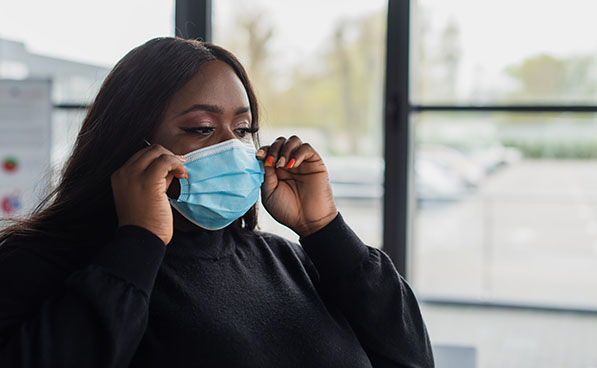The California Department of Public Health (CDPH) recently updated its face covering guidance and announced that it will not be extending its universal indoor face covering requirement set to expire on February 15, 2022.
Back in December, the CDPH issued an order requiring universal indoor face coverings for all individuals, regardless of vaccination status. Then, due to rising cases of the Omicron variant in January, the department extended its order an additional month. Ahead of its expiration, the CDPH announced that, with COVID-19 conditions improving and the Omicron surge subsiding, it won’t be extending its universal indoor face covering requirement. The CDPH also issued revised face covering guidance that takes effect February 16, 2022.
Under the new rules, universal indoor face covering is still required, regardless of vaccination status, in certain places, including:
- On public transit (such as airplanes, ships, ferries, trains, subways, buses, taxis, and ride-shares) and in transportation hubs (such as airports, bus terminals, marinas, train stations, seaports or other ports, subway stations, or any other areas that provide transportation).
- Indoorsin K-12 schools, childcare settings.
- Emergency shelters and cooling and heating centers.
- Health care settings.
- State and local correctional facilities and detention centers.
- Homeless shelters.
- Long term care settings and adult and senior care facilities.
Outside of those locations, face coverings are still required for all unvaccinated individuals in indoor public settings and businesses (such as retail, restaurants, theaters, family entertainment centers, meetings, and state and local government offices serving the public).
The CDPH recommends that fully vaccinated individuals continue indoor masking when the risk may be high. Surgical masks or higher-level respirators (e.g., N95s, KN95s, KF94s) with a good fit are highly recommended.
For businesses where unvaccinated individuals must wear face coverings, the CDPH says businesses, venue operators or hosts may choose to:
- Provide information to all patrons, guests and attendees regarding vaccination requirements and allow vaccinated individuals to self-attest that they are in compliance prior to entry.
- Implement vaccine verification to determine whether individuals are required to wear a mask.
- Require all patrons to wear masks.
The revised CDPH guidance also contains face covering requirement exceptions for certain individuals, such as children under two years old, persons with medical conditions or disabilities, hearing impaired individuals and those persons for whom wearing a face covering would create a workplace risk.
Though CDPH guidance is relaxing statewide face covering requirements, employers still need to monitor local health orders. To align with the new CDPH guidance, 11 bay area counties will lift their universal face covering orders effective February 16, 2022. However, other jurisdictions, such as Santa Clara County and Los Angeles County, will continue to require indoor face coverings regardless of vaccination status for the time being.
Employers must also continue to comply with the Division of Occupational Safety and Health (Cal/OSHA) COVID-19 Emergency Temporary Standard (ETS) face covering requirements. Generally, the revised CDPH guidance is more closely aligned with ETS requirements. The ETS requires unvaccinated individuals to wear face coverings indoors and generally allows fully vaccinated individuals to forego face coverings; however, the ETS has additional face covering requirements in certain circumstances, such as employee screening, close contacts and outbreak situations.
Employers should continue to monitor and review guidance from Cal/OSHA, the CDPH and local health departments for any changes to COVID-19 workplace requirements.
James W. Ward, Employment Law Subject Matter Expert/Legal Writer and Editor
Visit the CalChamber Coronavirus (COVID-19) webpage for more COVID-19-related federal, state and local resources, including CalChamber coverage.



